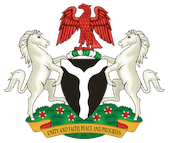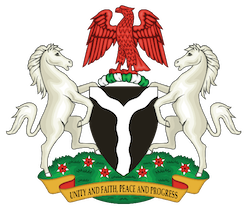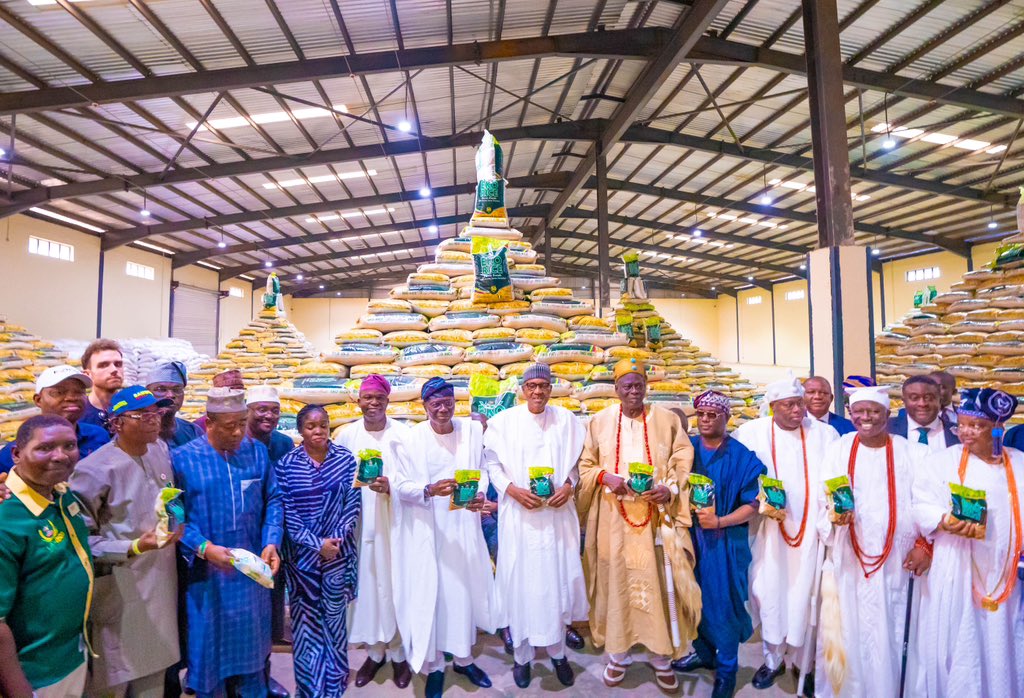Lagos rice mill and food security
It is no longer news that President Muhammadu Buhari has officially commissioned the 32-metric tons per hour Lagos Rice Mill in Imota, Ikorodu.
The integrated rice mill at Imota is a 22-hectare facility with the rice mill taking about 8.5 hectares and consists of a complete set of new mills, two warehouses, 16 silos with a storage capacity of 40 metric tonnes each, water treatment plant, effluent processing plant, staff quarters, administrative block, car park and firefighting facility, amongst others
The President was taken round the facility by the Lagos State governor, Mr. Babajide Sanwo-Olu in company of the Commissioner for Agriculture, Ms Abisola Olusanya and other top government officials.
While speaking at the event, noted that the President is happy about the project, adding that the Lagos Rice Mill is part of the State Government’s resolve to complement the Federal Government‘s rice revolution.
According to the governor, the Rice Mill, which is the largest in Africa and third largest in the world, will generate about 250,000 direct and indirect jobs for Lagosians. This, he said, will contribute enormously to the economy of the immediate community where the mill is located, Lagos State and the country as a whole.
He said that the Imota rice mill is an effort by the Lagos State to support the country’s rice revolution
He said that the mill will create jobs and help drive sustainable growth and that the state is glad to be part of the country’s agricultural revolutions.
“It will create jobs and help drive sustainable growth and we are glad to be part of the country’s agricultural revolution,” he noted.
The Rice Mill, is a 2 by 16 Metric Tonnes per hour standing on an area of 8.5Ha land with an annual paddy requirement of over 240,000MT to produce 2.5 million bags of 50kg rice per annum.
The integrated rice milling operation in Lagos State started on the success of the Rice for Job Programme, which began in 2008. The programme covered all aspects of the rice value chain such as Paddy processing among others. It graduated about 1,000 rice farmers across the value chain.
From the outset, the Mr. Babajide Sanwo-Olu administration’s accorded the Imota Rice Mill a priority attention. Recall that one of the earliest tasks of Sanwo-Olu was a working visit to the mill where he promised to speed up the completion of the project.
The governor, who visited the mills in the company of his Deputy, Dr. Obafemi Hamzat, the Head of Service, Mr. Hakeem Muri-Okunola and other top government functionaries, reiterated his administration’s commitment to enhancing food security in the state.
Now, with its completion, the mill is capable of providing for the rice needs of a considerable proportion of Lagos residents. In order to further ensure that the rice need of Lagosians is adequately catered for, the government is already collaborating with the South West and Northern states, as well as the Rice Farmers Association (REFAN) for the acquisition of rice paddy.
Without a doubt, the state government has demonstrated that it is unreservedly committed to the Federal Government policy on food production.
Towards this end, it is already in discussion with other states, especially those with the capacity to provide land for rice cultivation. Consequently, some of them have offered to make available about 72,000 hectares of land in their respective states. This is certainly a boost for Lagos’ renewed drive for rice cultivation.
According to the 2017/2018 report from the Rice Farmers Association (REFAN), the apex rice farmers’ body has the ability to produce 10 million tonnes of rice.
Sadly, however, only a tiny fraction of that capacity is being optimally put to use. It is this shortfall that the Lagos Rice Mill is expected to fill.
Fortunately, the World Bank is coming to the aid of the state government in this fresh impetus to promote food security. This is being done with focus on the value chain with a view to enhancing the capacity of the rice farmers and the entire value chain.
Aside hunger and malnutrition, food insecurity equally results in a wide range of other problems such as health hazards, environmental degradation and high rate of crime. Conversely, to the extent that food security improves, most facets of life improve as well.
Our reliance on importation of rice has been to the disadvantage of our local economy. Resources that could have been spent to boost capacity of agro-economy were channelled to the importation of rice which has lost its nutritional value due to years of preservation. In 2016, Nigeria rice importation stood at 2.3 million tonnes, with $5million averagely spent on each shipment.
Former Minister of Agriculture and current President of the African Development Bank, (ADB) Dr. Akinwumi Adesina, once disclosed that in 2010 alone, the nation spent a staggering N635b on wheat importation, N35b on rice importation, N217b on sugar importation and another N97b spent on fish importation! Just imagine how much impact such amount of money could have had on our nation if it had been invested in improving critical infrastructure across the country.
It is, therefore, heartwarming that Sanwo-Olu fulfilled his solemn pledge to complete the all-important Lagos Integrated Rice Mill in record time.
With a growing population of over 20 million, it is wise and convenient for Lagos State to embrace food security. Aside hunger and malnutrition, food insecurity equally results in a wide range of other problems such as health, environmental degradation, and high rate of crime.
Being the country’s Center of Excellence, it is pleasing that Lagos has taken a cue from countries such as China, Thailand and Vietnam, by setting up a huge rice mill. This would further enhance the state’s capacity to generate more revenue, thereby meeting more needs of the citizenry.
With the coming on board of the rice mill, Sanwo-Olu has, no doubt, taken another giant leap in his administration’s ‘Greater Lagos’ vision. Surely, a Greater Lagos is rising!




